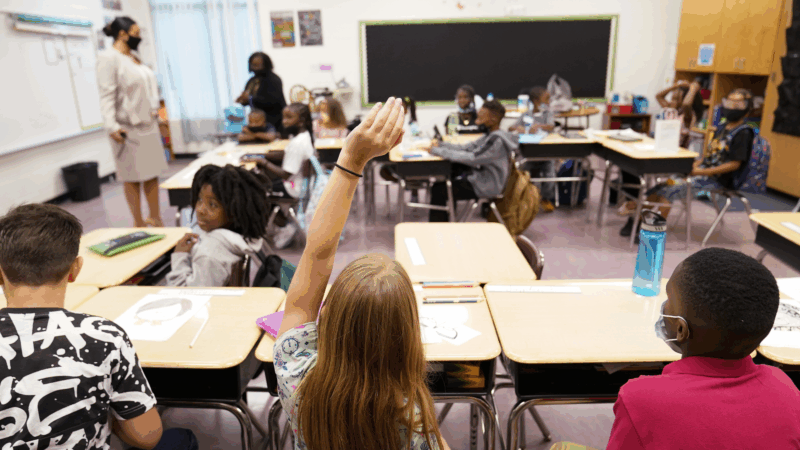In reading, the nation’s students are still stuck in a pandemic slump
When it comes to reading, the nation’s third- through eighth-graders are still mired in a pandemic-era slump, according to new testing data. In math, the news is only a little more heartening: Student achievement in those grades either held steady or improved slightly, though all grades remain behind performance levels of same-grade students in 2019.
The data comes from NWEA, a K-12 testing and research organization, and its Spring 2025 MAP Growth assessment, a suite of tests taken by millions of students in thousands of U.S. schools.
“Math is crawling back, however modestly, but reading isn’t budging,” says Karyn Lewis, vice president of research at NWEA. “I know people want this chapter to be over, but these data remind us it isn’t. Looking away won’t make the problem disappear; it means accepting these outcomes are permanent. That is not an option.”
NWEA is also unveiling a new tool that will be publicly available: A performance dashboard meant to help school leaders and policymakers understand how their students are faring compared to a broad, representative sample of the country.
Reading scores remain stuck
There’s little good news in the spring 2025 reading scores. They show slight gains made across grade levels in 2022 have been erased, with students across grade levels mostly performing at or even below pandemic-era achievement lows.
In short, students from third- through eighth grade are still performing worse than students in the same grades in 2019. This “stagnation is consistent regardless of race/ethnicity or school poverty level,” NWEA said in a press release.
Math scores rebound slightly
There’s a little more room for optimism in the spring 2025 math achievement data.
Students in several grades made slight gains compared to the same age groups in 2024. Most grades have also shown slow but steady improvement since 2021.
One more positive: This improvement in math achievement has come across student groups, regardless of race/ethnicity or socio-economic status.
Unfortunately, in spring 2025, no grades were performing in math at the levels seen in 2019, before the pandemic.
NWEA’s takeaways mirror similarly worrying patterns highlighted by federal data released earlier this year as part of what’s known as the Nation’s Report Card.
A new performance dashboard
NWEA has also released a new public-facing dashboard for schools and politicians to gauge where their local students are performing relative to the rest of the country.
The dashboard will be updated with new data three times a year – far more often than comparable data from the Nation’s Report Card, which only comes out every two years.
Tom Kane, of Harvard University’s Center for Education Policy Research, likens these rounds of student achievement data to helpful health checks to see how students are doing.
“Two years is too long for American students to go between doctor visits, especially when recovering from a major injury, such as occurred during the pandemic,” Kane says, calling the data available through this new dashboard “an essential complement to [the Nation’s Report Card] for tracking students’ recovery.”
Megan Kuhfeld, director of growth modeling and data analytics at NWEA, says, “Given the unevenness of recovery, even within schools and classrooms, national trends like these are an important first step to understanding where to dig deeper at the local level and ask critical questions about the necessary support and resources.”
The move to give districts and states more data to help inform their decision-making – including on whether and how to spend scarce school dollars on academic interventions – comes as the Trump administration has gutted the Institute of Education Sciences (IES), the division within the U.S. Department of Education that collects, analyzes and publishes federal student achievement data.
FCC calls for more ‘patriotic, pro-America’ programming in runup to 250th anniversary
The "Pledge America Campaign" urges broadcasters to focus on programming that highlights "the historic accomplishments of this great nation from our founding through the Trump Administration today."
NASA’s Artemis II lunar mission may not launch in March after all
NASA says an "interrupted flow" of helium to the rocket system could require a rollback to the Vehicle Assembly Building. If it happens, NASA says the launch to the moon would be delayed until April.
Mississippi health system shuts down clinics statewide after ransomware attack
The attack was launched on Thursday and prompted hospital officials to close all of its 35 clinics across the state.
Blizzard conditions and high winds forecast for NYC, East coast
The winter storm is expected to bring blizzard conditions and possibly up to 2 feet of snow in New York City.
Norway’s Johannes Klæbo is new Winter Olympics king
Johannes Klaebo won all six cross-country skiing events at this year's Winter Olympics, the surpassing Eric Heiden's five golds in 1980.
Willie Colón, salsa pioneer, has died at 75
The South Bronx bandleader took the Latin genre to new heights while recording for Fania Records.






